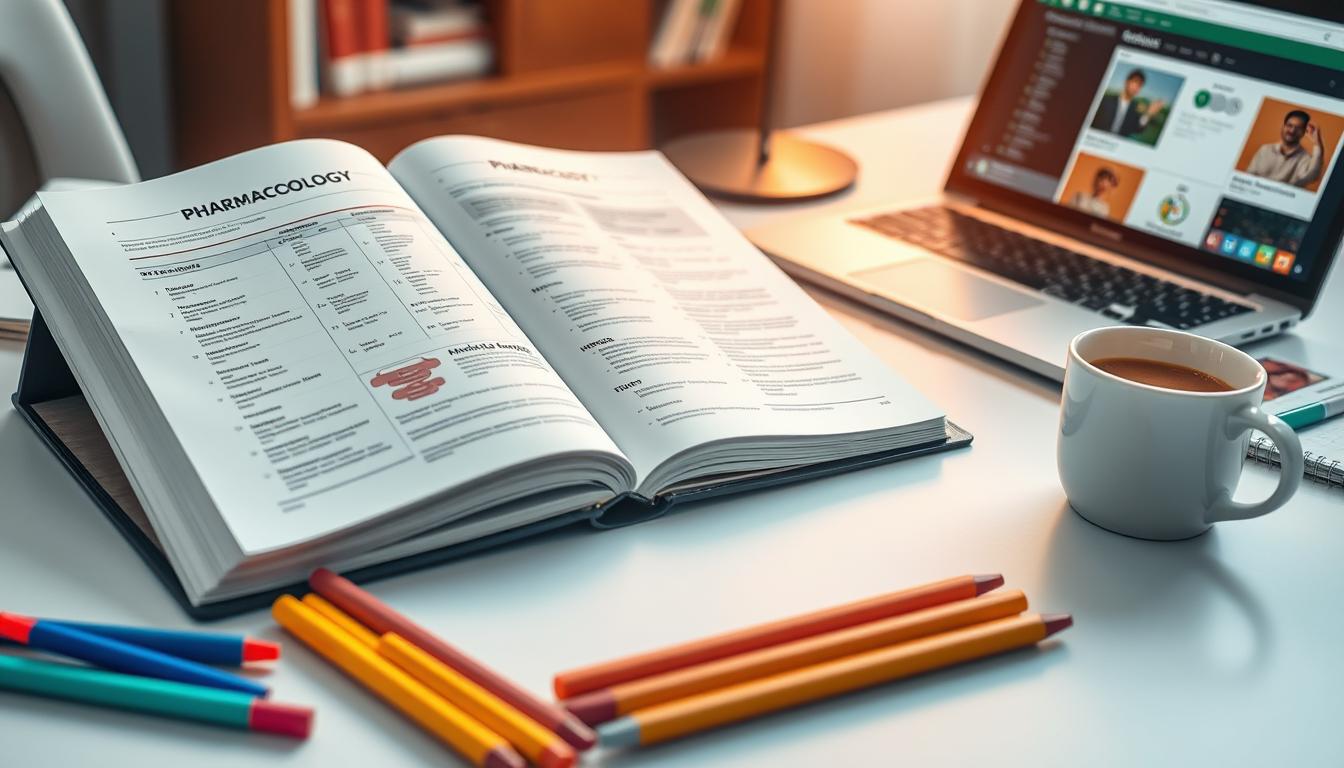
Mastering Pharmacology can seem tough, but with the right approach, you can ace your test. This guide will give you the tools and insights to do well in your pharmacology exam. You’ll learn about key concepts, study tips, and how to apply them in real life.
Getting ready for a pharmacology test means knowing the main parts that are usually tested. Let’s look at the key areas you need to focus on: drug classifications and how they work, the basics of how drugs are absorbed and used by the body, and keeping safe from drug interactions.
It’s important to know how drugs are grouped and how they work. Classes like antibiotics, antidepressants, and antihypertensives act in different ways. They can stop bacteria from growing or change how our brain chemicals work. Knowing these details and their side effects will help you do well on pharmacology questions.
Understanding pharmacokinetics and pharmacodynamics is key. Pharmacokinetics looks at how drugs get into and leave our bodies. Pharmacodynamics is about how drugs work with our cells to help us. Knowing these basics will help you with questions on monitoring drug levels and the FDA approval process and clinical trials.
Tests often check if you know about keeping safe with medications and how they can interact. Things like side effects, when not to use a drug, and how drugs can affect each other are very important. Learning about these safety topics will help you make smart choices and teach others about using medicines wisely.
Mastering pharmacology needs a smart way to learn and use key ideas. You must remember drug names and understand how drugs work together. There are proven ways to help you do well in pharmacology studies.
One good strategy is to make visual aids like mind maps or flowcharts. These help you organize and connect drug types, how they work, and how they are absorbed by the body. This makes it easier to remember and use this info on tests and in real life.
Also, getting involved in case studies and real-life drug use helps you understand the importance of therapeutic monitoring, dosage calculations, and pharmacogenomics. By practicing these skills, you’ll get better at following FDA regulations and keeping up with new drug mechanisms.
By using these key study strategies, you’ll be on your way to mastering pharmacology. You’ll do well on tests and in your future healthcare career.
| Study Strategy | Benefits |
|---|---|
| Visual Aids | Improved recall and interconnection of pharmacological concepts |
| Clinical Applications | Deeper understanding of real-world medication management |
| Staying Updated | Awareness of the latest advancements in pharmacogenomics and regulations |
| Mastering Fundamentals | Expertise in therapeutic monitoring and dosage calculations |
To ace your pharmacology test, it’s not just about memorizing facts. You need to practice with real-world scenarios. This section will guide you through various practice methods. They’re designed to help you understand and apply your knowledge in practical ways.
Start with clinical case studies that reflect real-life scenarios. These studies will test your ability to apply pharmaceutical regulations, drug development, and therapeutic applications. You’ll analyze patient cases, suggest treatments, and think about drug interactions and medication adherence.
Pharmacology tests also focus on drug dosage calculations. Improve your skills with practice problems on drug calculations. These include unit conversions, dosage adjustments, and drug metabolism. Mastering these skills will prepare you for the numerical parts of your exam.
Therapeutic monitoring is key in pharmacology. Practice interpreting lab results and adjusting drug regimens. These exercises will help you understand drug metabolism and therapeutic applications better.
By using these practice methods, you’ll gain confidence and skill for your pharmacology test. Apply your knowledge in real, clinical scenarios. This will help you reach your full potential in healthcare.
As you finish this guide on acing your pharmacology test, remember it’s more than just passing. The knowledge you’ve learned will be key in your healthcare career. It’s about understanding drugs, their uses, and how to prescribe them.
Keep learning and stay current with new research in pharmacology. Study side effects, uses, and drug interactions to give the best care. Use the study tips and practice methods from this guide to become a pharmacology expert.
Your success in this field depends on your commitment to learning and applying pharmacology in your work. Face challenges, stay curious, and keep learning. With dedication and a love for pharmacology, you’ll do well in your test and your future in healthcare